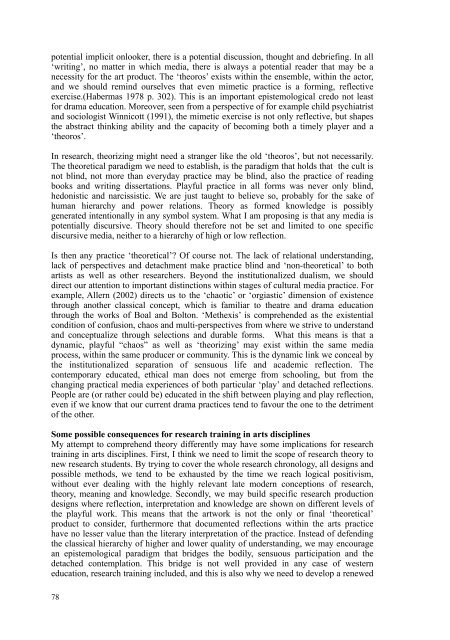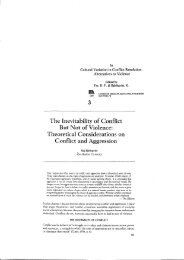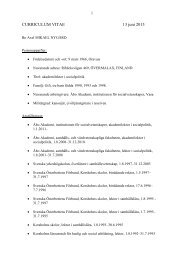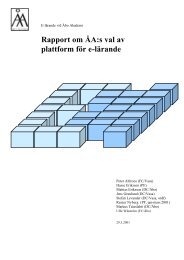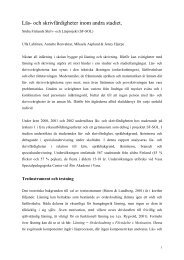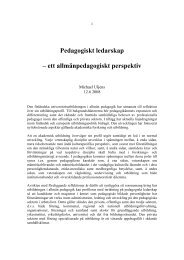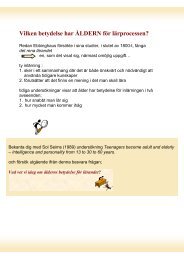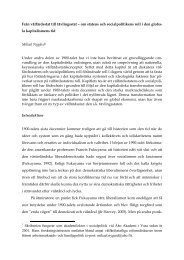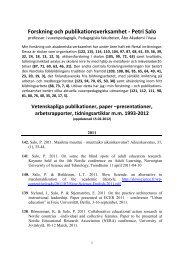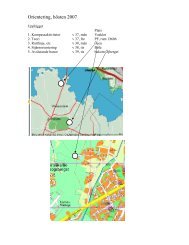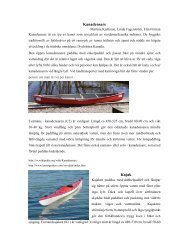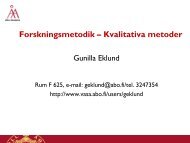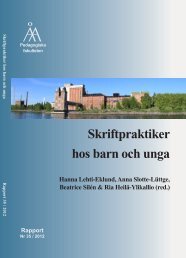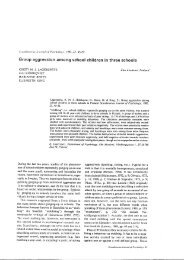Drama Boreale - Åbo Akademi
Drama Boreale - Åbo Akademi
Drama Boreale - Åbo Akademi
You also want an ePaper? Increase the reach of your titles
YUMPU automatically turns print PDFs into web optimized ePapers that Google loves.
potential implicit onlooker, there is a potential discussion, thought and debriefing. In all<br />
‘writing’, no matter in which media, there is always a potential reader that may be a<br />
necessity for the art product. The ‘theoros’ exists within the ensemble, within the actor,<br />
and we should remind ourselves that even mimetic practice is a forming, reflective<br />
exercise.(Habermas 1978 p. 302). This is an important epistemological credo not least<br />
for drama education. Moreover, seen from a perspective of for example child psychiatrist<br />
and sociologist Winnicott (1991), the mimetic exercise is not only reflective, but shapes<br />
the abstract thinking ability and the capacity of becoming both a timely player and a<br />
‘theoros’.<br />
In research, theorizing might need a stranger like the old ‘theoros’, but not necessarily.<br />
The theoretical paradigm we need to establish, is the paradigm that holds that the cult is<br />
not blind, not more than everyday practice may be blind, also the practice of reading<br />
books and writing dissertations. Playful practice in all forms was never only blind,<br />
hedonistic and narcissistic. We are just taught to believe so, probably for the sake of<br />
human hierarchy and power relations. Theory as formed knowledge is possibly<br />
generated intentionally in any symbol system. What I am proposing is that any media is<br />
potentially discursive. Theory should therefore not be set and limited to one specific<br />
discursive media, neither to a hierarchy of high or low reflection.<br />
Is then any practice ‘theoretical’? Of course not. The lack of relational understanding,<br />
lack of perspectives and detachment make practice blind and ‘non-theoretical’ to both<br />
artists as well as other researchers. Beyond the institutionalized dualism, we should<br />
direct our attention to important distinctions within stages of cultural media practice. For<br />
example, Allern (2002) directs us to the ‘chaotic’ or ‘orgiastic’ dimension of existence<br />
through another classical concept, which is familiar to theatre and drama education<br />
through the works of Boal and Bolton. ‘Methexis’ is comprehended as the existential<br />
condition of confusion, chaos and multi-perspectives from where we strive to understand<br />
and conceptualize through selections and durable forms. What this means is that a<br />
dynamic, playful “chaos” as well as ‘theorizing’ may exist within the same media<br />
process, within the same producer or community. This is the dynamic link we conceal by<br />
the institutionalized separation of sensuous life and academic reflection. The<br />
contemporary educated, ethical man does not emerge from schooling, but from the<br />
changing practical media experiences of both particular ‘play’ and detached reflections.<br />
People are (or rather could be) educated in the shift between playing and play reflection,<br />
even if we know that our current drama practices tend to favour the one to the detriment<br />
of the other.<br />
Some possible consequences for research training in arts disciplines<br />
My attempt to comprehend theory differently may have some implications for research<br />
training in arts disciplines. First, I think we need to limit the scope of research theory to<br />
new research students. By trying to cover the whole research chronology, all designs and<br />
possible methods, we tend to be exhausted by the time we reach logical positivism,<br />
without ever dealing with the highly relevant late modern conceptions of research,<br />
theory, meaning and knowledge. Secondly, we may build specific research production<br />
designs where reflection, interpretation and knowledge are shown on different levels of<br />
the playful work. This means that the artwork is not the only or final ‘theoretical’<br />
product to consider, furthermore that documented reflections within the arts practice<br />
have no lesser value than the literary interpretation of the practice. Instead of defending<br />
the classical hierarchy of higher and lower quality of understanding, we may encourage<br />
an epistemological paradigm that bridges the bodily, sensuous participation and the<br />
detached contemplation. This bridge is not well provided in any case of western<br />
education, research training included, and this is also why we need to develop a renewed<br />
78


